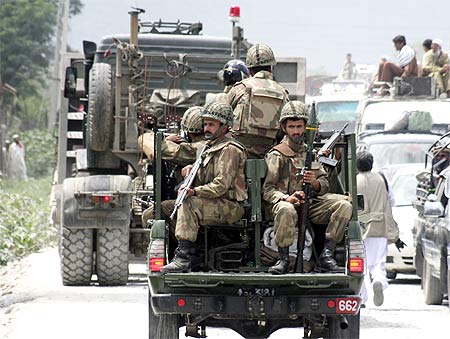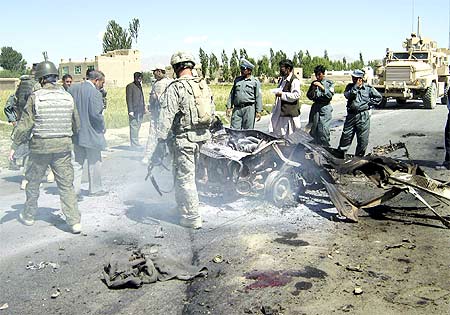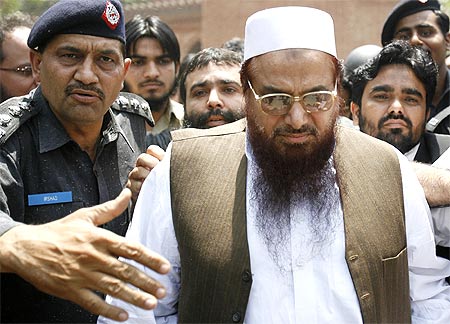Photographs: Arko Dutta/Reuters
Ridel, a former Central Intelligence Agency analyst on South Asia who spearheaded President Obama's strategic review on Afghanistan and Pakistan, has returned to his position as a senior fellow at the Brookings Institution after his two-month stint in the White House crafting President Obama's AfPak strategic review.
In a wide-ranging exclusive interview with Rediff India Abroad's Aziz Haniffa, Riedel, said Prime Minister Manmohan Singh has to be lauded for reaching out to Pakistan President Asif Ali Zardari recently in Russia.
He, however, argued that this does not mean "Pakistan should be taken off the hook, by any means, and in particular, it should be an imperative of American policy to support the demand for Pakistan to shut down Lashkar-e-Tayiba once and for all."
He said the Lashkar, responsible for the Mumbai terror attacks, was moving more and more into "the mainstream of the global Islamic jihad," and it was more than likely that "we face a very serious danger of marrying the goals of Al Qaeda with the capabilities of Lashkar-e-Tayiba, which would be a global menace not just to Indian interests, but to American interests and interests of many other countries around the world."'Pak is paranoid about India's role in Afghanistan'
Image: Pakistani troops head towards the Swat valley in Dargai May 8, 2009.Photographs: Asif Aziz/Reuters
Meanwhile, he asserted that there's not going to be any "fundamental change between India and Pakistan," unless the issue of Kashmir is addressed, and he said that Prime Minister Singh "ought to be open to going back" to the composite dialogue and the back-channel discussions on the Kashmir issue, "as long as there is clear indication that the Lashkar-e-Tayiba and its fellow travelers are put out of business and shut down."
Riedel said the jihadists were not just 60 miles from Islamabad as was being breathlessly reported by the world media after the Taliban captured the Swat valley and surrounding areas, which has now apparently been taken back by the Pakistan army.
"I always thought the imagery of 60 miles from Islamabad was misplaced, because the jihadists are in Islamabad, they are in Lahore, they are in Karachi." On Pakistan's regular spiel in recent months that it should be offered a similar deal by the US, akin to the US-Indian civilian nuclear deal, he called it not just wishful thinking, but something that will never come to pass, particularly in an Obama administration, because "Pakistan cannot escape the legacy of A Q Khan."
At the Brookings seminar the other day on an update on the US strategy on Afghanistan and Pakistan, you spoke about how crucial India was as a strategic ally of the United States in this regard and how integral Delhi's role is as President Obama pursues his AfPak policy. Why?
I believe that India is absolutely crucial, both to our policy toward Pakistan and Afghanistan. Towards Pakistan, the tensions between India and Pakistan and that it could get worse constantly threatens to undermine, if not completely destroy everything we are trying to do to persuade Pakistan cease being a hothouse of terror and cease being a source of threat to the region.
In Afghanistan, India has a large role to play in helping to stabilise the (Afghan President Hamid) Karzai government and providing resources to do that is absolutely crucial in that regard.
Pakistan has been paranoid about India's role in Afghanistan and India, as you pointed out that the recent Brookings event, has apparently in a deliberate manner kept a sort of low profile, providing the resources and assistance to Afghanistan to develop its infrastructure and development needs instead of any military or security assistance to combat Al Qaeda and the Taliban.
But India obviously finds the deteriorating situation in Afghanistan as much or more a threat to its national security as it is to Washington? India knows from bitter experience in the past that instability in Afghanistan, particularly jihadist-inspired instability can pose a threat to India's own national interests.
The hijacking of IC-814, and the whole bitter experience of Kandahar in 1999, is a vivid reminder to Indians that a Taliban government -- a jihadist government in Afghanistan -- is a threat to India's national interests. And, the Indian government, over the course of the last seven years, has done a lot in Afghanistan, particularly in the extreme southwest.
Now, the Pakistanis have tended to see this in the worst possible light, which I think is unfortunate, and we should look for ways to try to encourage Indian stabilising activity in Afghanistan and persuade the Pakistanis not to see this as a zero-sum game for them.
'I don't see evidence that India is the source of the unrest in Balochistan'
Image: Security personnel at the scene of a suicide blast, Ghazni city, Pakistan, June 23, 2009.Photographs: Nasratullah Wahidi/Reuters
I don't know of much credible evidence of Indian support to the insurgency in Balochistan, which I believe is largely self-generating. India has increased its diplomatic and humanitarian and economic presence in Afghanistan, and I know this fuels the paranoia of those in Pakistan who see this as all directed against them.
But I don't see a whole lot of evidence to support the notion that India is the source of the unrest in Balochistan.
You have maintained at several fora recently that Pakistan was engaged in selective counter-terrorism -- the good jihadi who serve their interests against India as opposed to the bad jihadi, who are a threat to the establishment in Islamabad. Why do they continue to persist with this strategy?
Because the military establishment in Pakistan and its friends in the political establishment continue to see some of these groups as assets that are useful to Pakistan's national security strategy -- the Afghan Taliban and the Lashkar-e-Tayiba in particular. Their calculation is that these groups continue to serve their interests.
'US must support the demand for Pakistan to shut down Lashkar'
Image: Prime Minister Manmohan Singh and Pakistan President Asif Ali Zardar in Yekaterinburg, RussiaPhotographs: Sergei Karpukhin/Reuters
I don't believe it is inevitable. I think that we can influence the calculations in Rawalpindi about the future. We can do that in several ways. By making clear that we are going to build in Afghanistan, an Afghan national security establishment that's going to be able to protect its own country -- an Afghan army that's big enough and well-trained and equipped and that the Taliban will be a liability for Pakistan in the long term.
And, I think, between India and Pakistan, we have to encourage a process of cooling tensions -- getting back to the composite dialogue and have the back-channel that undermine the logic of groups like Lashkar-e-Tayiba and undermine the position of those in the Pakistani establishment who believe that's the right approach.
The fact that Prime Minister (Manmohan) Singh agreed to meet with (Pakistan President Asif Ali) Zardari in Russia, shows that the New Delhi government recognises the wisdom of doing that. The prime minister has to be given a strong vote of support for doing this.
It would have been very easy to take the position that Zardari has to do something first, but the prime minister wisely chose the posture of reaching out. This does not mean that Pakistan should be taken off the hook by any means, and in particular, it should be an imperative of American policy to support the demand for Pakistan to shut down Lashkar-e-Tayiba once and for all.
'Selective counter-terrorism is not a sufficient answer'
Image: Police escort Lashkar-e-Taiba founder Hafiz Saeed, in Lahore, May 5, 2009.Photographs: Mohsin Raza/Reuters
It's certainly going to be very difficult but that should not be an excuse for inaction. If Lashkar-e-Tayiba is moving more and more into the mainstream of the global Islamic jihad -- because I think it is and because the attack on Mumbai showed it is -- then we face a very serious danger of marrying the goals of Al Qaeda with the capabilities of Lashkar-e-Tayiba, which would be a global menace not just to Indian interests, but to American interests, and to interests of many other countries around the world.
But how do you control this outfit, when Pakistan for all of the pressure from the US, as you say, see it as a strategic asset and far from coming down on them and shutting it down and destroying its leadership, release the likes of (Lashkar founder)Hafiz Muhammad Saeed and others?
We can only do it through constant intense engagement with the Pakistanis, pushing, cajoling, encouraging, to make clear all the time that selective counter-terrorism is not a sufficient answer.
But at the same time, hasn't the US got to balance its approach in that you don't push them too hard for fear that it may lead to the unraveling of this very nascent and weak civilian government led by Zardari? How do you make sure you don't go beyond the tipping point?
That's true. It's a tough balancing act, (but) I guess I'll lean a bit harder on let's be clear and unequivocal about the need to shut down all terrorist groups, not just the ones in the Swat valley. As much as I want them to shut down the Swat valley operations, the Swat valley is not the source of terror against either America or India.






article